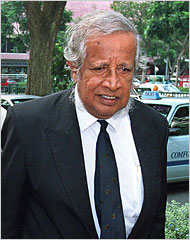Ilankai Tamil Sangam28th Year on the Web Association of Tamils of Sri Lanka in the USA |
|||
 Home Home Archives Archives |
J. B. Jeyaretnam, Persistent Opposition Figure in Singapore, Is Dead at 82
J. B. Jeyaretnam, an opposition politician whose persistent outspokenness made him a leading dissident in Singapore and a hero to many there, died on Sept. 20. He was 82. 
Mr. Jeyaretnam in 1999. The cause was a heart attack, family members said. Mr. Jeyaretnam’s steadfast opposition and repeated electoral defeats stood in counterpoint to the rising economic success of Singapore in its 43 years as an independent city-state, now with 4.5 million people. As a price for their affluence, most people there accept restrictions on civil liberties and free speech. Few have called for fundamental change, as Mr. Jeyaretnam did. “We are not allowed to exercise the fundamental rights given to us in the Constitution,” he said in May in announcing the formation of a new party, the Reform Party, whose objective, he said, was “a complete and thorough change in the way this country is run.” “These are not abstract rights, airy-fairy rights, but rights that are most essential to our well-being: the right to speak up freely, the right to tell the government that the way things are going is wrong,” he said. In his refusal to compromise, Mr. Jeyaretnam was an irritant to the country’s leaders, particularly its founder, Lee Kuan Yew, who called him “a poseur, always seeking publicity, good or bad.” Mr. Jeyaretnam’s career was defined by his repeated attempts to win a seat in Parliament, starting in 1971, and his unyielding criticism of the political establishment’s maneuvers to keep him out. In 1981, he finally broke the governing party’s monopoly in Parliament by winning the first opposition seat. But he lost his seat twice through legal actions and was sued for defamation more times than he said he could count, paying hundreds of thousands of dollars in damages, mostly to members of the governing People’s Action Party. Recently freed from bankruptcy, Mr. Jeyaretnam was preparing another run for Parliament under the Reform Party banner. He fell into bankruptcy in 2001 when he was unable to pay a damage award and was barred from politics until he cleared the debt early this year. In political exile, he sold self-published books from a cardboard box on a sidewalk, shouting out their titles in the booming voice he had used to challenge the government in Parliament. Though his photograph rarely appeared in the government-friendly press, the man known by his initials, J.B.J., was easy to recognize with his long, somber face, exaggerated features and white whiskers. “A lot of people tell me: ‘Why do you carry on? It’s hopeless in this place,’ ” he said in an interview at the time. But he added, “If I had to give it up, I wouldn’t know what to do.” Joshua Benjamin Jeyaretnam was born in 1926 and grew up mostly in what was then Malaya, where his father was a clerk in the public works department. An Anglican Christian of Sri Lankan descent, Mr. Jeyaretnam often said he was motivated by a religious mission to do good for other people. He earned a law degree at University College in London in 1951, where he met his wife, Margaret. She died in 1980. Mr. Jeyaretnam rose quickly in the Singapore legal establishment, eventually becoming chief of the Subordinate Judiciary, a position of status and influence. He resigned in 1963 — “disillusioned,” he said — at the age of 37 and went into private practice before mounting his first run for a seat in Parliament in 1971. He is survived by his two sons, Philip, a lawyer who is president of the Law Society of Singapore, and Kenneth, an economist, at whose home he died. As word of Mr. Jeyaretnam’s death spread in Singapore, tributes multiplied on the Internet. One said, “My sincere and highest respect for Mr. J.B.J., who has taught what is democracy in Singapore.”
| ||